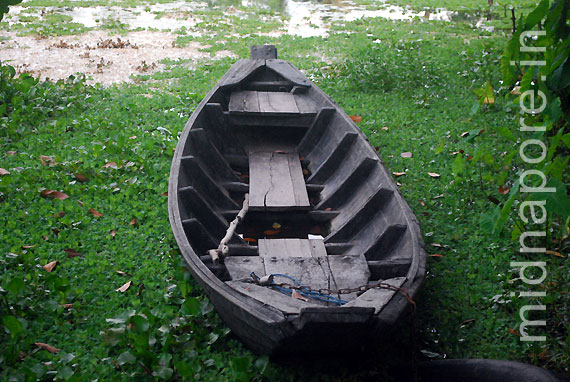Thanks to Mr. Bayley, a great deal of information about the reign of Radhashyamananda (1822 - 82) has been documented. There may be slight discrepancy about dates but the framework remains unimpaired.Though Radhashyamananda's forebears accepted the five - years, ten - years and the permanent settlement contract of the British, within three years he started defaulting in payment of rent. The excuse given was that the low-lying marshy lands were continually susceptible to inundation. The rent was unproportionately high. But the fact was that with the deposition of silt year after year, the land ought to be high. Experience has shown that one year's crop was enough to compensate for four years' loss. Moreover there was no chance of draught as in the Jangalmohal in the west. So, the land was fragmented in small taluks and distributed among others. They also could not pay rent. As a result, the rent was decreased . Please note, that even after more than two hundred years the geological assesment of Moyna done in the past by the British has not undergone any change.

Orissa Ratha-Daul (Chariot-Temple) styled ‘Radha-Krishna' temple, Panchet Garh, East Medinipur.
The King of Moyna then showed interest in negotiating those lands. An auction was called of those lands that had their rent previously fixed and those that were newly fixed under imaginary names. But the subterfuge was exposed and immediately the settlement was cancelled. The taluks that were taken in the names of Lalmohan Das and Subitra Dey — both fake names — remained with the King and ultimately proved to be very profitable.Then it so happened that Raja Gopalendranarayan Roy of Sujamutha arrived as the regent of the minor King Radhashyamananda and using this as an excuse started usurping many of the taluks which were under false names. He even unabashedly transferred many valuable
movable property elsewhere. The matter reached the Court of Law and Gopalendra was found guilty. We had also heard in our childhood of embezzlement of diamonds and other precious stones, and the golden banana stalk . Moreover, this childless Gopalendra was idle, pleasure - loving and had many such vices. Bayley has also said that Gopalendra had to undergo many ordeals for not being able to repay the loan of one lakh and ten thousand taken from the Palchowdhuris of Ranaghat.

Orissa Ratha-Daul (Chariot-Temple) styled ‘Radha-Krishna' temple, Panchet Garh, East Medinipur.
Next comes the marriage of Radhashyamananda to the daughter of the King of Tamluk, Lakshminarayan Roy. And then ensues drama after drama — the appointment of one Ramkrishna Roy as the manager by recommendation from his in-laws, his betrayal, subsequent embezzlement of funds, removal from his post; mortgaging private and personal farmlands and crofts etc. Again an auction was held and as if by peripety or reversal of fortune the avaricious Ramkrishna lost, defeated by the intellengence of an agent Kali Maity in favour of a Hareram Bera .Then follows a series of exciting incidents:- on that very day Ramkrishna's lifeless corpse was discovered under a tree, Kali Maity was sentenced to death on murder charge, subsequently totally acquitted due to deft handling of the case etc. we need not go into further details. Mr. Baley was surprised by the fact that Radhashymananda had never tried to acquire Zamindari in his name. One reason could be that there existed a decree in favour of the Dewan of Mahishadal, Anandachandra Ghosh for non-payment of a debt of Rs seventyfive thousand, though this decree had been nullified in time at the civil court. Radhashyamananda was very close to the English collectors. He had quietly planned to build up many things slowly. Mr. Bayley could never ascertain why Radhashyamananda expressed his wish to buy Zemindari in the name of his wife, but had never actually done so.
|
How was Bayley to know that Radhashyamananda's emotions were highly agitated at that time ? Being enamoured by the beautiful singer and dancer of his court he was increasingly being attracted towards her which resulted in his gradual aloofness towards his queen. As is a figure of the recent past many legends and anecdotes about him are circulated among his relatives, and kinsmen, servants and acquaintances, through generations which exist till now. His seems to be a crisis-ridden life _ the crisis of his existence, the crisis of enhancing his prestige, the crisis of regaining independence and side by side the crisis in quest of pleasure. The catastrophe was inevitable. Nothing happened according to plan and he was confronted by the unrelenting Fate like a greek tragic hero.No history, neither any contemporary intilligence roport can ever reveal the turmoil that was riving his heart. The limitation of history lies here. It has its sight fixed towards the wide avenues of society and Kingdom, it does not have the time to peep into the maze of a human |
|
heart _its longings and aspirations, its failures and sorrows. The life of this man has always cast an enchantment on me. Though it will be out of context, yet I can not resist myself from writing a few paragraphs about him. In fact, had I the capacity, I would have written a novel on him.
Anandananda, Radhashymanand's father, was a widower for long. In a weak moment, while indulging in youthful pleasures he had promised his mistress, taking an oath in the waters of the Ganga, that her son alone would inherit his kingdom. This is of course not unique. If you open the pages of the original Mahabharata by vedavyas you will see that Shakuntala, an ashram lass, extracted a similar promise from Dushyanta.
Quite unexpectedly, the last days of Anadananda were close at hand. The seven years old Radhashyam, who had lost his mother
was busy playing with his bow and arrow in the temple yard. He did not have the capacity to follow the customs of his family. There was an age-old custom --- only the sons born of legal wife were entitled to assume the surname `Ananda' & `Bahubalindra'.The other sons were deprived of this right, only a legal wife would garland the king, but she would have to detach herself from the king after the birth of her first son. She would live a life of luxury but would never meet the king. The women, who would then come as consorts would not get the prestige of a wife and in a special marriage called "Shaili marriage" they would place the garland on the king's thighs. They would reside in separate blocks outside the main moat and their children would adopt different surnames. Nodoubt, it is a very cruel practice. Radhashyamananda was the first to refuse to follow this archaic custom. He felt it was hypocritical to honour one's legal wife publicly and insult her in private.
 |
|
 |
Let us return to the main story. The son of the mistress was dressing up in a room outside for the coronation, and all arrangements, according to tradition, were ready. It was to be a small but solemn occasion before the king's death when a little blood from his small finger was to be put on the forehead of the person. Sanctity of the `Raj Tilak' was so significant. once this was done it could never be retracted and it would be binding on everybody. The purohit, and the high Officials were already in their places waiting for the phenomenal occasion when the dewan came running to the king who was lying in a semi-conscious state. He ordered the head sentry in a forceful voice to lock the gate of the castle : `stop the unwanted man, the usurper, who wants to be king. Your responsibility is to see that not even a fly gets inside'. Then he whispered slowly to the king with folded hands :: `pardon me please, this is the first time I have disobeyed your orders. I can never pick up a piece of glass
overlooking a piece of diamond. I can not enthrone the son of a waiting maid in place of the Queen's son. Anandananda's eyes remained closed but his lips trembled a little. was he trying to speak? The Dewan, an expert in anticipating the king's thoughts, uttered these words emphatically : `My Lord, this sin of breach of promise shall come upon me ; kindly rest assured. Consecration is a hallowed ceremony, not meant for all and sundry.' |

